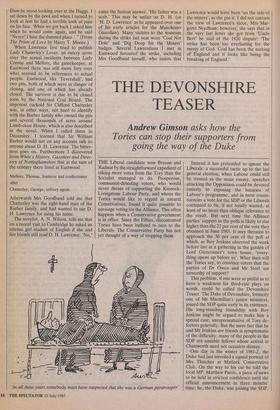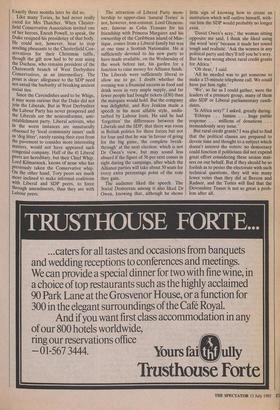THE DEVONSHIRE TEASER
Andrew Gimson asks how the
Tories can stop their supporters from going the way of the Duke
THE Liberal candidate won Brecon and Radnor by the straightforward expedient of taking more votes from the Tory than the Socialist managed to do. Prosperous, communist-detesting voters, who would never dream of supporting the Kinnock- Livingstone Labour Party, and whom the Tories would like to regard as natural Conservatives, found it quite possible to envisage voting for the Alliance. This often happens when a Conservative government is in office. Since the Fifties, discontented Tories have been inclined to turn to the Liberals. The Conservative Party has not yet thought of a way of stopping them. Instead it has pretended to ignore the Liberals: a successful tactic up to the last general election, when Labour could still be treated as the main enemy, speeches attacking the Opposition could be devoted entirely to exposing the lunacies of Labour's programme, and in most consti- tuencies a vote for the SDP or the Liberals continued to be, if not totally wasted, at least of no more than oblique relevance to the result. But next time the Alliance parties' support in the polls is likely to rise higher than the 27 per cent of the vote they obtained in June 1983. It may threaten to approach the 36 per cent of the poll at which, as Roy Jenkins observed the week before last at a gathering in the garden of Lord Glenconner's town house, 'every- thing opens up before us'. What then will the Tories say, to convince voters that the parties of Dr Owen and Mr Steel are unworthy of support?
This problem, if one were so pitiful as to have a weakness for third-rate plays on words, could be called the Devonshire Teaser. The Duke of Devonshire, formerly one of Mr Macmillan's junior ministers, joined the SDP quite early in its existence. His long-standing friendship with Roy Jenkins might be argued to make him a special case, unrepresentative of Tory de- fectors generally. But the mere fact that he and Mr Jenkins are friends is symptomatic of the difficulty: many of the people in the SDP are amiable fellows whose arrival at Chatsworth need not occasion dismay.
One day in the winter of 1981-2, the Duke had just unveiled a signed portrait of Mrs Thatcher at Matlock Conservative Club. On the way to his car he told the local MP, Matthew Parris, a piece of news to be held in strictest confidence until the official announcement in three months' time: he, the Duke, was joining the SDP. 'In all these years somebody must have suspected that she was a German paratrooper' 16 THE SPECTATOR 13 July 1985 Exactly three months later he did so.
Like many Tories, he had never really cared for Mrs Thatcher. When Chester- field Conservative Association invited one of her heroes, Enoch Powell, to speak, the Duke resigned his presidency of that body. He could not, however, bear to stop sending pheasants to the Chesterfield Con- servatives for their Christmas raffle, though the gift now had to be sent using the Duchess, who remains president of the Chatsworth branch of West Derbyshire Conservatives, as an intermediary. The point is clear: allegiance to the SDP need not entail the barbarity of breaking ancient social ties.
Since the Cavendishes used to be Whigs, it may seem curious that the Duke did not join the Liberals. But in West Derbyshire the Labour Party has never prospered and the Liberals are the nonconformist, anti- establishment party. Liberal activists, who in the worst instances are unnaturally obsessed by 'local community issues' such as 'dog litter', rarely raising their eyes from the pavement to consider more interesting matters, would not have appeared such Congenial company. Half of the 41 Liberal Peers are hereditary, but their Chief Whip, Lord Kilmarnock, knows of none who has Previously taken the Conservative whip. On the other hand, Tory peers are much more inclined to make informal coalitions With Liberal and SDP peers, to force through amendments, than they are with Labour peers. The attraction of Liberal Party mem- bership to upper-class 'natural Tories' is not, however, non-existent. Lord Glencon- ner, famous as Colin Tennant for his friendship with Princess Margaret and his ownership of the Caribbean island of Mus- tique, comes from a Liberal family but was at one time a Scottish Nationalist. He is sufficiently devoted to his new party to have made available, on the Wednesday of the week before last, his garden for a function to raise money for Alliance funds. The Liberals were sufficiently liberal to allow me to go. I doubt whether the evening was a financial success as food and drink were in very ample supply, and far fewer people had bought tickets (£30) than the marquee would hold. But the company was delightful, and Roy Jenkins made a speech in his most affable style, undis- turbed by Labour louts. He said he had 'forgotten' the differences between the Liberals and the SDP, that there was room in British politics for three forces but not for four and that he was in favour of going for the big game, the complete break- through' at the next election: which is not Dr Owen's view, but may sound less absurd if the figure of 36 per cent comes in sight during the campaign, after which the Alliance parties will take about 50 seats for every extra percentage point of the vote they gain.
The audience liked the speech. The Social Democrats among it also liked Dr Owen, knowing that, although he shows little sign of knowing how to create an institution which will outlive himself, with- out him the SDP would probably no longer exist.
'David Owen's sexy,' the woman sitting opposite me said. I think she liked using the word 'sexy' because it made her sound tough and realistic. 'Ask the women in any political party and they'll tell you he's sexy. But he was wrong about rural credit grants for Africa.'
'Oh dear,' I said.
'All he needed was to get someone to make a 15-minute telephone call. We could have put him right.'
'We', so far as I could gather, were the leaders of a pressure group, many of them also SDP or Liberal parliamentary candi- dates.
'Is Africa sexy?' I asked, greatly daring.
'Ethiopa . . . famine . . . huge public response . . . millions of donations . . tremendously sexy issue.'
But rural credit grants? I was glad to find that the political classes are prepared to devote time and thought to a subject which doesn't interest the voters: no democracy could function if politicians did not expend great effort considering these arcane mat- ters on our behalf. But if they should be so foolish as to pester the electorate with such technical questions, they will win many fewer votes than they did at Brecon and Radnor, and the Tories will find that the Devonshire Teaser is not so great a prob- lem after all.











































 Previous page
Previous page